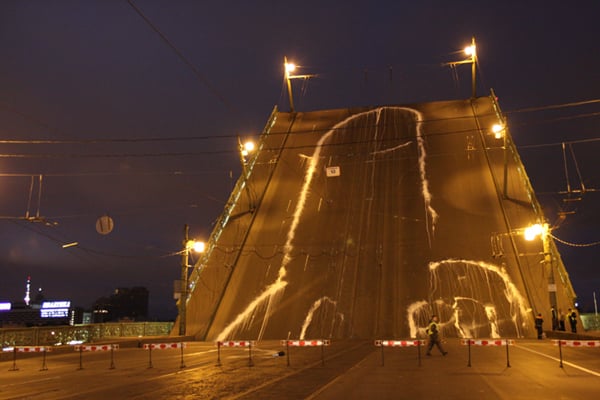Art Fairs
Founder of Russian Artist Collective Voina Praises Crimean Annexation


Sarah Cascone

Russian artist Oleg Vorotnikov is known for his outspoken criticism of the Russian government as founder of dissident artist collective Voina, which helped spawn Pussy Riot. In a surprising turn of events, Vorotnikov, who is currently wanted by Russian police, has come out in favor of his country’s recent annexation of the Crimean region of Ukraine, reports the Art Newspaper.
Openborder, a recent cultural festival in Amsterdam, asked Voina to participate in the event. A statement for the festival posted on the Openborder website condemned Russia’s “armed intervention in Crimea, Ukraine.” Not only did Vorotnikov reject the invitation, he accused the Dutch group of attempting to disseminate anti-Russian propaganda and wanting “to display us before the international community as traitors to Russia.”
Among Vorotnikov’s earlier artistic acts, he adorned a St Petersburg bridge with a painting of a penis, he flipped cop cars over, and had sex with his partner Natalia Sokol in a museum to protest the 2008 election of Dmitry Medvedev.
Though it may seem strange given the collective’s radical past, Vorotnikov claims “the Voina group has a fundamentally different and opposite position” regarding the annexation. “We are happy that Crimea has joined Russia and are happy for the people of Crimea. I am proud of my country, for the first time in a long time.”
Pussy Riot member Nadezhda Tolokonnikova and her husband, Pyotr Verzilo, are both former members of Voina. The female group has been outspoken in its criticism of Russia’s interference in Ukraine, but other formerly radical Russian artists have also voiced their support of a Russian Crimea.
Prague-based artist Avdei Ter-Oganyan, forced to leave Russia in 1998 and seek asylum in the Czech Republic, has consistently referred to Ukrainian protesters against the Russian government as fascists. He described the annexation as “the only good thing that Putin has done,” and posted a photo of his great-grandfather, a Crimean War hero. A further 150 Russian artists and cultural figures, including major museum officials, publicly endorsed Putin’s actions in the region back in March (see artnet News report).